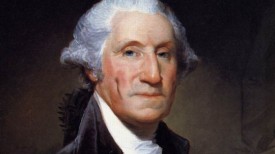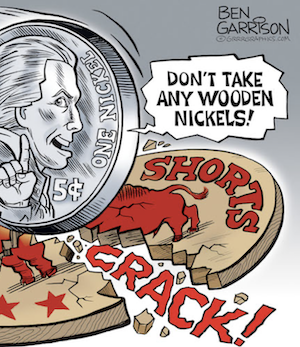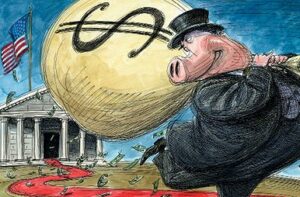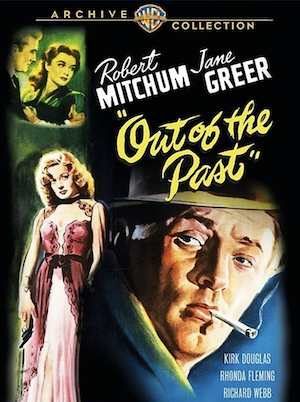 President George Washington received a bill that would create a national bank if he didn’t veto within 10 days. National-government power to print money not backed 100% by reserves of gold or silver had been voted down by Washington’s Constitutional Convention by a supermajority of 9 to 2. Four short years later, Treasury secretary Alexander Hamilton claimed the opposite: that the Constitution implies that the national government can create a national bank that prints fractional-reserve money. Washington ran with this, didn’t veto, and instead signed the bill creating the national bank.
President George Washington received a bill that would create a national bank if he didn’t veto within 10 days. National-government power to print money not backed 100% by reserves of gold or silver had been voted down by Washington’s Constitutional Convention by a supermajority of 9 to 2. Four short years later, Treasury secretary Alexander Hamilton claimed the opposite: that the Constitution implies that the national government can create a national bank that prints fractional-reserve money. Washington ran with this, didn’t veto, and instead signed the bill creating the national bank.
President Andrew Jackson received a bill that would renew the charter of a national bank that printed fractional-reserve money if he didn’t veto within ten days. Jackson vetoed.
Unconstitutional Inflation
When government people allow the quantity of money to exceed the amount of gold or silver held in reserve, this violates the Constitution. It exceeds the national government’s specifically enumerated power to coin money. More fundamentally, it fails to secure people’s right to keep their own property (rights ensured here and here).
Everyone who has money in any account loses purchasing power when an inflated quantity of money is used to buy a constant production volume of stuff. The inflation loss doesn’t appear everywhere all at once; it starts first where the new money is added and eventually spreads to everywhere else.
Money is newly created by banks when they make loans. Loan recipients at first purchase stuff at existing prices, prices that were set before the new money was created. As more money continues to become available to customers who all want the same items, those customers bid those items’ prices up. Lately, with money creation keeping interest rates low, the people close to the front of the line for the newly created money have been using this extra money to buy assets, so the first prices to rise have been the prices of assets.
But higher asset prices increase producers’ investment costs. To stay in business, producers must raise prices sooner or later. Most people don’t handle the newly created money early on, so the newly created money gives most people no benefits, and it harms them by inflating the prices of everything.
Everyone who has money in any account also loses purchasing power when the stock of money that’s earned by people who add value is skimmed by bankers, who create money out of thin air, loan out this unearned money, and extract unearned interest. Government people let bankers make loans by just writing checks to borrowers and recording the loan amounts in the bankers’ accounting books. Bankers hold only small fractional reserves, so bankers take in little deposit money and pay little deposit interest. Bankers add little value. Bankers do charge loan interest, subtracting much value. So, then, everyone else adds value by voluntarily cooperating with one another, and bankers just skim off some of the value added by everyone else.
Summing up all such inflation losses, from 1941 to 2018, people who held balances of U.S. dollars lost purchasing power totaling an astounding 94%!
Unconstitutional Recessions
Because of government-fiat fractional-reserve money, everyone who adds value also gets subjected to further losses of income and wealth due to avoidable recessions.
When the quantity of money is constant, interest rates help customers’ current decisions to save stay in sync with business people’s current decisions to invest. Business people can invest in the present, and customers will have savings available to buy the resulting production in the future. Savings-driven investment goes far to ensure that investments pay off and turn out good.
When the quantity of money is increased by unconstitutional creation of money and debt by government-enabled bankers, interest rates fall unnaturally low. These government-manipulated interest rates mislead people.
With money more freely available, customers see less need to save, and both customers and business people borrow more in order to spend even more. Business people invest more on longer-term, riskier bets.
Eventually people become unwilling or unable to keep making the payments on more and more debt, and people start paying down some of their debt or defaulting. Would-be customers don’t have money saved that they can use to buy the products of the added investment, so products don’t sell, and investments don’t pay off. Debt-driven investment ensures that many more investments don’t pay off and turn out to be bad.
The people who lose out aren’t just the business-managers; the people who lose out are all people who add value. When would-be customers finally do scale back, producers finally see this coming only after they’ve already created lots of inventory, and work-in-process, and intermediate products used to make final consumer products. So when customers scale back somewhat, producers need to scale back much more. This is recession. In recessions, less value is added, people’s incomes are held down, and some people lose jobs.
All these losses can be paid for only by the only available source of productive effort: the people who add value.
Meanwhile, bankers keep taking in their unearned interest. Government people in good times take credit and in bad times blame other people and ratchet up more coercive controls that cause more problems.
Congresspeople almost never repeal existing mistakes.
Stop New Losses
Washington’s signing of the national bank statute opened up a major new offensive front of unconstitutional government activities in money and banking. This moved the national government decisively away from securing property rights by requiring 100% reserves in banking.
Jackson’s national bank veto, and successor President Martin Van Buren‘s signing of a statute requiring banks’ fractional reserves to be gold or silver, pushed back against Washington’s inflationary banking. Jackson and Van Buren made the long-term trend in prices become gradual deflation. With the government keeping the quantity of dollars relatively constant, every time productivity increased, the value of people’s dollars increased.
But neither Jackson nor Van Buren, nor any successor up through today, required 100% reserves in banking. This has forced the people who add value to bear the losses from a series of avoidable recessions.
The early Democrats like Jackson and Van Buren at least governed inexpensively, with light regulation and no bailouts. This let the people who add value keep adding value during recessions so that during at least one recession — a deep one in 1839–1843 closely comparable to the Great Depression — real output adjusted for deflation, and the resulting standard of living actually rose significantly.
Secure rights to life, to liberty, and to keep your own property are Supreme Law that’s aspirational. Securing these rights in practice takes political power and good work. Much remains to be done. A minimum starting point is to first add no further harm.
In modern America, nearly all legislation unconstitutionally exceeds the national government’s enumerated powers, delegates lawmaking, or grabs executive power or judicial power.
A constitutionalist president’s default position must be to sign every repeal and veto everything else.
Government people have the only powers strong enough to limit government. Using those powers is the only thing that makes our rights secure.
Written by James Anthony for The American Thinker ~ May 22, 2019








